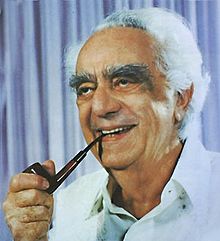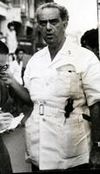- David Marshall (Singaporean politician)
-
For other people named David Marshall, see David Marshall (disambiguation).
David Saul Marshall 
1st Chief Minister of Singapore In office
April 6, 1955 – June 7, 1956Governor Sir John Fearns Nicoll (1952–55)
Sir William Goode (1955)
Sir Robert Brown Black (1955–57)Preceded by Newly Created Succeeded by Lim Yew Hock Personal details Born March 12, 1908
SingaporeDied December 12, 1995 (aged 87)
SingaporeNationality Singaporean Political party Workers' Party of Singapore (1959–95) Alma mater University of London Profession Politician and Diplomat Religion Judaism David Saul Marshall (12 March 1908 – 12 December 1995) was the leader of the Singapore Labour Front and became the first Chief Minister of Singapore in 1955.
Born into an Orthodox Jewish family descended from Indian Baghdadi Jews in Singapore, David Marshall was educated at Saint Joseph's Institution, Saint Andrew's School and then Raffles Institution. He became interested in politics and the independence movement at an early age. He was called to the Bar in 1937 after graduating from the University of London and the Middle Temple in Britain. He later became the most successful criminal lawyer in Singapore, with a reputation "Marshall never loses". Known for his sharp eloquence and imposing stances, he claimed that he had secured 99 acquittals out of 100 cases he defended for murder during Singapore's period of using trial by jury. When Singapore's leader (and Marshall's political opponent) Lee Kuan Yew abolished the jury system in 1969, he quoted Marshall's reputation to illustrate its "inadequacy".
In the Second World War, with Japanese forces advancing through Asia, David Marshall joined the Singapore Volunteer Corps and was taken prisoner after the Fall of Singapore in 1942. He was sent to work in the coal mines of Hokkaidō, Japan and survived 26 work-camps before being released in 1945.
A colorful and stirring orator, Marshall led the left-wing Labour Front to a narrow victory in Singapore's first Legislative Assembly election in April 1955. He formed a minority government and become Chief Minister. He presided over a shaky government, receiving little cooperation from either the colonial authorities or the other local parties. In May 1955, the Hock Lee Bus Riots broke out, killing 4 people.
In April 1956 he led a delegation to London to negotiate for complete self-rule, but the talks broke down over British concerns about worker unrest and communist influence. After the failed meeting, Marshall resigned saying "I have failed in my Merdeka mission". Replacing him as Chief Minister was Lim Yew Hock, who would later take very tough action against the labour unions. However, Lim Yew Hock, like the subsequent PAP government, also built on many of Marshall's other ideas and reforms.
After resigning, Marshall visited China for two months, at the invitation of Premier Zhou Enlai. Contacted by a representative of a group of over 400 Russian Jews who were being refused exit from Shanghai by the Chinese authorities, Marshall intervened with the Premier and managed to have them released.ISBN 978-1-4259-9935-3
After returning to Singapore, Marshall stayed on the backbenches before quitting the ruling Labour Front party in 1957 and founding the Workers' Party of Singapore. He lost his seat in the 1959 general election, but won a by-election in Anson in 1961. After losing his seat again in the 1963 elections, he returned to practise law and remained active in opposition politics even after J. B. Jeyaretnam became leader of the Workers' Party in 1972.
From 1978 to 1993, Marshall served as Singapore's Ambassador to France, Portugal, Spain and Switzerland. As ambassador, Marshall always defended his country's interests, despite his differences with Lee Kuan Yew's government. He retired from the diplomatic corps in 1993.
He was the brother of Joseph Saul Marshall who died under odd circumstances in Sydney in 1945, potentially connected to the Taman Shud Case.
David Marshall died in 1995 of lung cancer.
In memory of this political illuminary, the Marshall estate donated the bust of Mr Marshall, created by Hungarian sculptor Peter Lambda, to the SMU Law Faculty Moot Court and named the court after him. Mrs Marshall had hoped that the tribute will inspire all law students in the campus towards the qualities of passion, diligence, courage and integrity, qualities that gave to the remarkable lifetime achievements of the late Mr Marshall.[1]
References
- ^ Lim, Leonard (11 November, 2011). "Bust of David Marshall to grace SMU court named after him" (in English). Straits Times (Singapore).
- Sim, Susan (Dec. 13, 1995). "David Marshall". Straits Times.
- Curriculum Planning and Development Division, Ministry of Education, Singapore - History of Singapore, From Settlement to Nation. (December 2006)
- Arunasalam, Sitragandi. "David Saul Marshall" Infopedia.
External links
- Dharmendra Yadav interviews David Marshall in 1994
- Works by or about David Marshall (Singaporean politician) in libraries (WorldCat catalog)
Political offices Preceded by
Newly CreatedChief Minister of Singapore
April 6, 1955 - June 7, 1956Succeeded by
Lim Yew HockParliament of Singapore Preceded by
Newly CreatedMember of Parliament for Cairnhill
1955-1959Succeeded by
Lim Yew HockPreceded by
Mohamed Ariff bin BaharuddinMember of Parliament for Anson
1961-1963Succeeded by
Chiang Seok KeongCategories:- 1908 births
- 1995 deaths
- Singaporean lawyers
- Members of the Parliament of Singapore
- Raffles Institution alumni
- Saint Andrew's School, Singapore alumni
- Members of the Middle Temple
- Jewish politicians
- People of Iraqi descent
- Deaths from lung cancer
- Singaporean Jews
- Iraqi Jews
- Labour Front politicians
- Workers' Party of Singapore politicians
Wikimedia Foundation. 2010.

